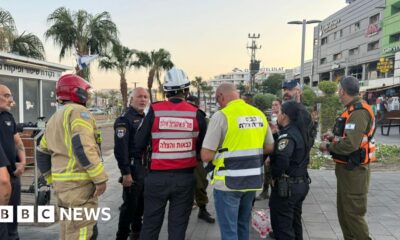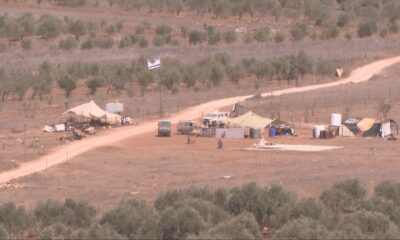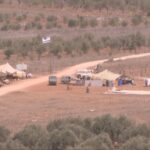Breaking News
Southport emergency crews initially sent to rendezvous point instead of attack scene

Read more on post .
Police and ambulances responding to the Southport attack were initially sent to a “rendezvous point” a mile and a half from the scene of the stabbings for their own safety, the inquiry has been told.
The decision by the control room supervisor was said to be in line with standard police protocols.
Alice da Silva Aguiar, nine, Bebe King, six, and Elsie Stancombe, seven, were killed at a Taylor Swift-themed dance class on 29 July last year by Axel Rudakubana, who was later jailed for a minimum of 52 years.
The first 999 call from teacher Leanne Lucas, who had herself been badly injured at 11.46am, stated there was a “boy with a knife” who had stabbed “numerous persons”, there were around 25 children, and there were “numerous casualties”.
Chief Inspector Andrew Hughes, Merseyside Police force incident manager, said the decision was made “to gather resources before I could make a decision on what was going to happen at the scene”.
John Goss, counsel to the inquiry, said that it might not be possible to “achieve an emergency response time” because officers “may need to hold back due to the level of risk”.
Five minutes later, Mr Hughes overruled the decision after deciding that firearms officers were “a significant distance away” and there was an “immediate duty to protect life”.
A second call had come in stating that an eight-year-old child had been stabbed, who was awake and breathing but another child was not breathing.
Mr Hughes sent unarmed police to the Hart Space to “approach with caution and assess the situation”, adding: “If safe, deal.”
“My overriding concern was article two, right to life,” he told the inquiry, referring to the Human Rights Act, and adding: “We needed to deploy officers straight to scene.”
The first officer to attend, Sergeant Greg Gillespie, diverted to the Hart Space before arriving at the rendezvous point at Southport police station.
He did not arrive until 10 minutes after the first emergency call but that was said to be within the designated response time to an emergency incident.
He entered the building less than a minute later, armed only with a baton and pepper spray, accompanied by another officer who arrived with a Taser.
The two officers detained Rudakubana, who by then had fatally stabbed the three girls.
More from the inquiry:
Taxi driver waited 50 minutes to call 999
Killer’s parents ‘knew risk he posed’
Alice and a number of other girls were being treated at the scene by members of the public.
Heidi Liddle and a young girl were still in the building, hiding in the toilets, after the youngster ran in the wrong direction and was rescued by Ms Liddle.
An ambulance driver followed Sgt Gillespie, although they had been told to go to the rendezvous point and was joined by colleagues.
However, the inquiry was told that police did not tell North West Ambulance Service (NWAS), the same service that dealt with the Manchester attack, that it was safe to approach the scene until 12.06pm.
Mr Hughes accepted that it had been a long time.
He also told the inquiry that he did not declare Operation Plato – the response to a marauding terrorist attack – in case it slowed down the response of the emergency services, who would be forced to stay back from the scene and wait for specially equipped colleagues to arrive.
“I am satisfied that it was the correct decision not to call Plato. It would have slowed the police response down,” he said.
“I would have had to brief other assets, zone the location, and restrict people going into the ‘hot zone.’ So, I am 100 per cent satisfied not to declare Plato was the right decision.”
The speed of the decision-making at Southport contrasted with the Manchester Arena bombing when ambulance crews were held back from the scene and firefighters did not arrive for more than two hours.
Mr Goss said there was “learning from the Manchester Arena inquiry that in some situations it may be appropriate even when there is, for example, a bladed weapon threat to deploy unarmed officers forward with caution”.
The inquiry also heard that when a taxi driver rang in, 50 minutes after the attack, to say he had taken the killer to the scene, they were able to identify his home address.
A check of the police record at 1.04pm recorded: “Check of this address. There is a male, Axel Rudakubana, warning marker for carrying knives.
“He has been logging on to school websites which involve mass shootings. He talks about guns and beheadings.”
Mr Hughes said that if they had received a call from Rudakubana’s father a week earlier, when he feared his son was planning to go to his old school with a knife, they would have sent officers to his home but had no powers to confiscate any weapons in the house.
He said: “It would be effectively trying to engage through the parents and say, ‘we want you to get those off him and hand them in,’ and probably making sure that that was in fact done.”
The inquiry continues.
Breaking News
No one-off measures in next year’s Budget – Donohoe

Read more on post.
The Minster for Finance has insisted there will be no repeat of last year’s once-off cost of living measures, but other permanent supports will be put in place in next month’s Budget.
Speaking at the Oireachtas Budgetary Oversight Committee, Paschal Donohoe said inflation has normalised, although the Government understands that prices have risen.
“Government is fully aware of the impact inflation has had on businesses and households throughout the country over recent years,” he said.
“Inflation has now returned to normal rates, but we are acutely conscious that price levels have risen in recent years, especially for necessities such as food. In this Budget, we will provide cost of living supports that are sustainable and permanent.”
Mr Donohoe told the Committee the economy is resilient, the public finances are in good shape and Modified Domestic Demand which measures activity in the domestic economy grew 4% in the first half of 2025.
However, he said it is not a time for complacency and the rate of growth of current spending has to be moderated. He also spoke the danger of over reliance on corporation tax receipts.
“Ireland must remain a top destination for multinational firms. These corporation tax revenues helped fund Government’s extraordinary response to the pandemic and the cost of living challenge,” he said.
“Nonetheless, I have warned on many occasions about the risks of overreliance on corporation tax. A highly concentrated tax base presents an inherent risk to sustainable public finances.
“Ten companies account for well over half of all corporate tax receipts. A negative shock to these companies would also negatively impact VAT and income tax revenues.”
Mr Donohoe said Budget 2026 is coming at a time of great uncertainty and the disruption of internationally settled trade rules will damage Ireland’s economic growth.
He said, however, the economy is fundamentally resilient.
Budget 2026 will be announced in the Dáil on 7 October by the Mr Donohoe and the Minister for Public Expenditure, Infrastructure, Public Services and Reform, Jack Chambers.
Breaking News
West Bank locals report ongoing Israeli settler expansion
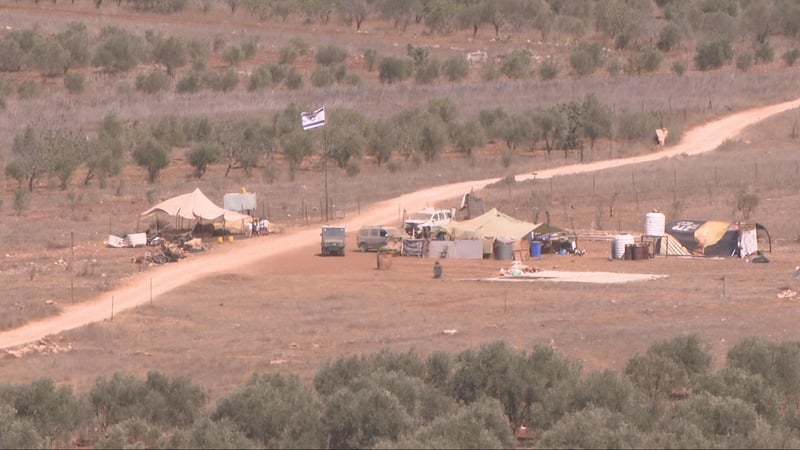
Read more on post.
Europe Editor Tony Connelly and cameraman Bram Verbeke report from Turmus Ayya and al-Mughayyir in the West Bank where locals report the continued expansion of Israel settlements and the destruction of local farms.
The ancient olive groves of the West Bank, the ideal retirement for a Palestinian-US citizen returning from California.
But, since 7 October, Israeli settlers from across the valley have intimidated Yasser Alkam from accessing his father’s legacy in Turmus Ayya.
Mr Alkam said he legally owns the land, adding that he has the paperwork and a title document for it.
However, in one incident, he said a gun was drawn on him, during which he was told “leave or else”.
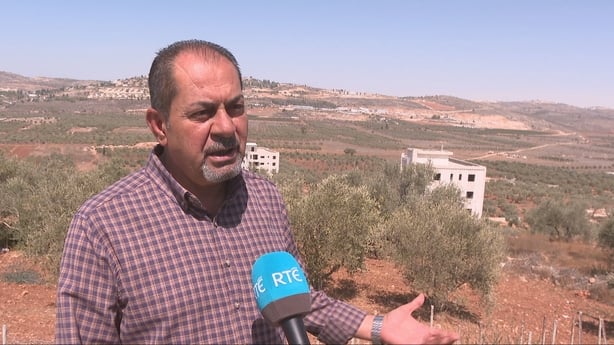
The legal rights count for little, as settlers seizing or destroying the olive groves are backed by the Israeli military, who mount nightly patrols around Mr Alkam’s neighbourhood and appear by day to support the expansion towards his town.
He noted that, two weeks ago, there was “one single tent” nearby, but added that currently there are two.
“One on the right side of the street and one on the left side of the street,” he said.
“It continues to spread out closer and closer to the town,” he added.
A settler witnessed the RTÉ News interview with Mr Alkam, and launched a drone that duly appeared and hovers above the interaction.
Watch: Drone hovers overhead while RTÉ News interviews Palestinian farmer in West Bank
Mr Alkum’s olive trees remain intact for now, but another village, 6km away, has not been so fortunate – as fresh settler outposts have sprung up.
There are two new and illegal outposts on the hills near the village.
But the real dispossession has happened in the valley, where hundreds of hectares of land were uprooted by bulldozers.
Over 10,000 olive trees were destroyed and taken away, according to the locals.
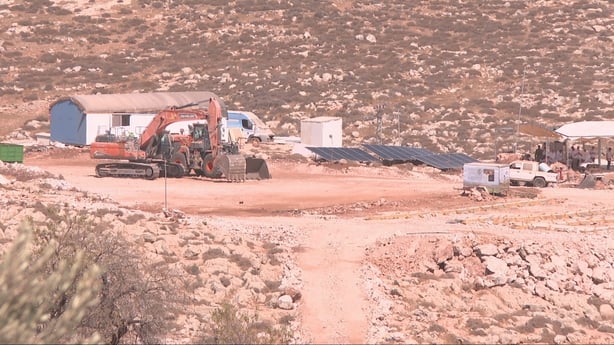
Locals say a confrontation with settlers last month triggered an assault by two busloads of military and settlers equipped with bulldozers.
Deputy head of the al-Mughayyir municipality Marzouq Abu Naem said the destroyed olive trees “would have provided 5,000 gallons of olive oil, each gallon worth $150”.
“All this income has gone, just like the olive trees themselves,” he said.
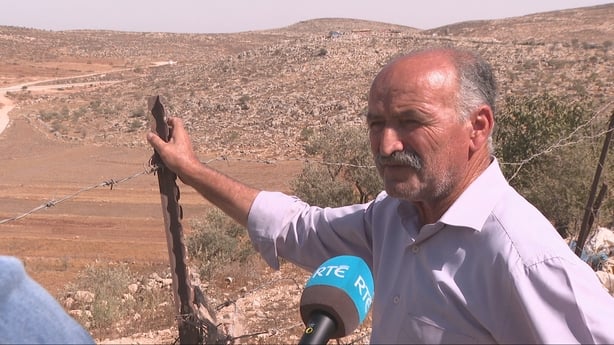
Mr Naem said the trees “represented our history, our culture”.
He added that people “collapsed in grief” when they saw the trees were gone.
Not long after RTÉ News visited, locals said settlers attacked again.
A local man was wounded and he later died of his injuries.
The funeral was held today.
Clashes between settlers and Palestinians have grown ever more deadly as Israel defiantly shrugs off international outrage over Gaza and turns its attention on the parched hills of the West Bank.
Breaking News
‘Nightmare bacteria’ cases rising in the US

Read more on post .
Infection rates from drug-resistant “nightmare bacteria” rose by 70% in the US, according to a new report.
The increase is driven by a difficult-to-treat gene called NDM, say researchers from the American Centers for Disease Control and Prevention.
Only two antibiotics work to treat it – and the drugs are expensive and have to be administered intraveneously.
Bacteria with the gene were once considered exotic, linked to a small number of patients who received medical care overseas, and though the numbers are still small, the rate of US cases jumped more than fivefold in recent years, the researchers reported.
“The rise of NDMs in the US is a grave danger and very worrisome,” said David Weiss, an infectious diseases researcher at Emory University in Atlanta, Georgia.
The report took data from 29 states. It counted 4,341 cases of carbapenem-resistant bacterial infections from those states in 2023, with 1,831 of them the NDM variety.
The rate of carbapenem-resistant infections rose from just under 2 per 100,000 people in 2019 to more than 3 per 100,000 in 2023 – an increase of 69%. But the rate of NDM cases rose from around 0.25 to about 1.35 – an increase of 460%, the authors said.
In recent years, the CDC has drawn attention to “nightmare bacteria” resistant to a wide range of antibiotics.
Carbapenems are a class of antibiotics considered a last resort for treatment of serious infections.
The researchers did not say how many of the infected people died.
It’s likely many people are unrecognised carriers of the drug-resistant bacteria, which could lead to community spread, the CDC scientists warned.
It is feared that infections long considered routine and easy to combat – like urinary tract infections – could become harder to treat, said Dr Maroya Walters, one of the report’s authors.
Read more from Sky News:
How a tractor, lifeboat and ambulance crew saved my life
The health claims made by Trump
Antimicrobial resistance occurs when germs such as bacteria and fungi gain the power to fight off the drugs designed to kill them.
The misuse of antibiotics was a big reason for the rise – unfinished or unnecessary prescriptions that didn’t kill the germs made them stronger.
‘Huge surge’
A researcher not involved in the study said the increase is probably related to the COVID-19 pandemic.
“We know that there was a huge surge in antibiotic use during the pandemic, so this likely is reflected in increasing drug resistance,” said Dr Jason Burnham, of Washington University.
The CDC’s count is also only a partial picture. Many states are not fully testing and reporting cases. Even in states that do, cases tend to only be among hospital patients sick enough to warrant special testing.
The CDC researchers did not have data from some of the most populous states, including California, Florida, New York and Texas, which means the absolute number of US infections “is definitely underestimated,” Dr Burnham said.
-
Breaking News1 day ago
Barack Obama to be conferred with freedom of Dublin at ceremony on Thursday
-
Culture1 day ago
Taylor Swift’s new cinema outing generates more than €12million in just 24 hours
-
Travel & Lifestyle2 days ago
The Best Way to See Rome? On a Running Tour at Sunrise
-
Culture1 day ago
Milan Fashion Week 2025: Unmissable shows and Giorgio Armani in mind
-
Politics1 day ago
European Parliament snubs Orbán with vote to shield Italian MEP from Hungarian arrest
-
Business9 hours ago
Households to be offered energy bill changes, but unlikely to lead to savings
-
Opinion2 days ago
Saving the best for last: How the Making In symposium left an indelible mark
-
Culture2 days ago
Marvel stars Mark Ruffalo and Pedro Pascal stand up for Jimmy Kimmel as Disney boycott intensifies






